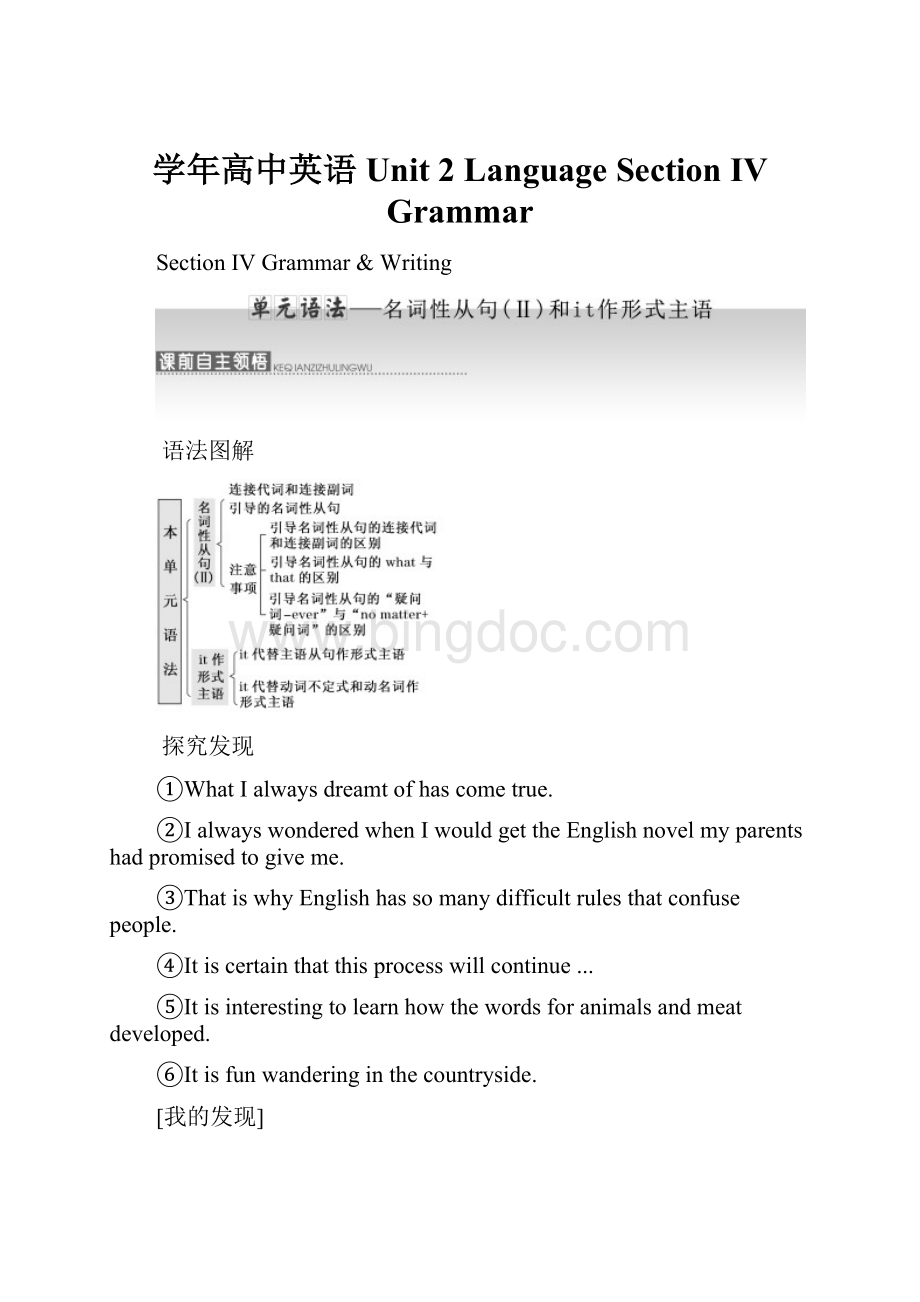学年高中英语 Unit 2 Language Section Ⅳ Grammar.docx
《学年高中英语 Unit 2 Language Section Ⅳ Grammar.docx》由会员分享,可在线阅读,更多相关《学年高中英语 Unit 2 Language Section Ⅳ Grammar.docx(13页珍藏版)》请在冰点文库上搜索。

学年高中英语Unit2LanguageSectionⅣGrammar
SectionⅣGrammar&Writing
语法图解
探究发现
①WhatIalwaysdreamtofhascometrue.
②IalwayswonderedwhenIwouldgettheEnglishnovelmyparentshadpromisedtogiveme.
③ThatiswhyEnglishhassomanydifficultrulesthatconfusepeople.
④Itiscertainthatthisprocesswillcontinue...
⑤Itisinterestingtolearnhowthewordsforanimalsandmeatdeveloped.
⑥Itisfunwanderinginthecountryside.
[我的发现]
(1)以上第①、②、③句中的黑体部分都是名词性从句,它们分别在各自的句子中作主语、宾语和表语。
(2)以上第④、⑤、⑥句中的黑体部分都是it作形式主语的用法,it分别替代的是主语从句、动词不定式和动名词短语。
一、名词性从句(Ⅱ)
(一)连接代词、连接副词引导的名词性从句
1.由what,which,who/whom,whose等连接代词和when,where,why,how等连接副词引导的名词性从句在句子中可以充当主语、宾语、表语或同位语。
(1)连接代词引导的名词性从句
Whatyouneedismorepractice.
你需要的是更多的练习。
MyquestioniswhowilltakeoverpresidentoftheFoundation.
我的问题是谁将接任该基金会主席职位。
Idon'tknowwhosewatchitis.
我不知这是谁的手表。
Doyouhaveanyideawhatitmeanstobepoor?
你知道贫穷意味着什么吗?
(2)连接副词引导的名词性从句
Wherewewillgohasn'tbeendecided.
我们要去哪儿还没有定下来。
Shealwaysthinksofhowshecanworkwell.
她总是在想怎样能把工作做好。
Ihadneitheraraincoatnoranumbrella.That'swhyIgotwetthrough.
我既没雨衣也没雨伞,那就是我淋湿的原因。
Ihavenoideawhenshewillbeback.
我不知道她何时回来。
[名师点津]
(1)名词性从句作主语时,谓语动词常用单数,但是如果what引导的主语从句代表复数概念,则谓语动词要用复数。
如:
Whatweneedareusefulbooks.
我们需要的是有用的书。
(2)连接代词which通常不用来引导同位语从句。
(3)由“wh�”词引导的名词性从句必须用陈述语序。
[即时演练1] 完成句子
①他为什么要这样做还不知道。
Whyhedidthisisnotknown.
②我们不能得到的似乎比我们已经拥有的更好。
What_we_can't_getseemsbetterthanwhatwehave.
③问题是谁能代替他。
Thequestioniswho_can_take_the_place_of_him.
④我不知道他何时到达北京。
Idon'tknowwhen_he_will_get_toBeijing.
(二)注意事项
1.引导名词性从句的连接代词和连接副词的区别。
(1)成分:
连接代词在从句中作主语、宾语、表语或定语;连接副词在从句中作状语。
(2)意义:
无论是连接代词还是连接副词,都有各自的意义。
That'swheretheaccidenttookplace.
那就是事故发生的地方。
(作状语,意为“……的地方”)
Shedidn'tknowwho/whomweweretalkingabout.
她不知道我们在谈论谁。
(作介词宾语,意为“谁”)
[即时演练2]
选词填空:
when,why,how,which,what,who,whom
①Doyouknowwhenthetrainarrives.
②Canyoutellmewhyyouchosethetopictowriteanarticle.
③HowIcanmakegreaterprogresslaterisaproblem.
④Whichteamwillwinisnotclear.
⑤WhatIwanttoknowiswhotookawaymybook.
⑥Theproblemiswhomweshouldhavedoit.
2.引导名词性从句的连接代词what与that的区别。
(1)that只起连接作用,在从句中不充当任何成分,也无任何意义。
(2)what引导从句,除起连接作用外,还在从句中作主语、宾语、表语等成分,这时what具有两个含义:
①保留疑问的意义,即“什么;什么样的”;②相当于“thething(s)that/which”,即“先行词+定语从句”的含义。
另外,what的此种用法还可以表示时间(thetimethat)、地点(theplacethat)、人物(thepersonthat)、数目(theamount/numberthat)等不同概念。
Ourincomeisnowdoublewhatitwastenyearsago.
我们现在的收入是10年前的两倍。
Thetroubleisthatshehaslosthisaddress.
麻烦在于她弄丢了他的地址。
Afterwhatseemedalongwait,theresultswereannounced.
经过了似乎漫长的等待之后,结果被宣布了。
[即时演练3] 单句改错
①Thattheprofessorsaidisofgreatimportance.That→What
②Thekeyisthatwecangetfromit.that→what
③Hesavesthatheearns.that→what
④Iknowthefactwhathecameheretwoyearsago.what→that
3.引导名词性从句的“疑问词ever”与“nomatter+疑问词”的区别。
whoever,whatever,whichever等既可引导名词性从句又可引导让步状语从句,而“nomatter+疑问词”只能引导让步状语从句。
Whoevertelephones(=Nomatterwhotelephones),tellthemI'mout.
不管是谁打电话,就说我出去了。
Nomatterwhatyousay,Ibelieveyou.
无论你说什么,我都相信你。
[即时演练4] 句型转换
①Anyonewhocomeshereiswelcome.
→Whoevercomeshereiswelcome.
②Youcandoanythingyoulike.
→Youcandowhateveryoulike.
二、it作形式主语
当不定式、动名词、从句等用作主语时,为避免头重脚轻,通常在句首使用形式主语it,而把真正的主语放在句子末尾。
1.代替主语从句
it代替主语从句的常用句式如下:
(1)Itbe+名词(apity,ashame,anhonour,agoodidea,amiracle,afact,commonknowledge,asurprise...)+从句。
ItisapitythatIcan'tgowithyoubecauseIhavetolookaftermylittlebrother.
我不能和你一起去真是太遗憾了,因为我必须照看我的弟弟。
It'safactthatmostdeathsfromlungcancerarecausedbysmoking.
大部分肺癌导致的死亡是由吸烟引起的,这是个事实。
(2)Itbe+形容词(clear,possible,likely,natural,certain,fortunate,necessary,strange,uncertain,obvious,important...)+从句。
It'sclear(that)hehasdonehisbest.
很明显他已经尽力而为了。
(3)It+be+过去分词(found,believed,reported,thought,noted,proved,known,decided,suggested,required...)+从句。
Itisnotyetdecidedwhowilldothatjob.
还没决定谁做那项工作。
(4)某些动词(短语)常用it作形式主语。
it常用作动词(短语)seem,appear,happen,turnout,chance等的主语。
IthappenedthatIwasinthecountrysideatthetime.
那时我恰巧在乡下。
[名师点津] “It+be+said/believed/reported...that...”句型一般可转换成“Sb./Sth.+besaid/believed/reported...+不定式”句型。
Itissaidthathehasgotadoctor'sdegree.
=Heissaidtohavegotadoctor'sdegree.
据说他获得了博士学位。
2.代替不定式短语
Itishardtopersuadehimtogowithme.
说服他跟我一块儿去很难。
3.代替动词ing形式短语
Itisnogoodreadingindimlight.
在昏暗的灯光下读书没有好处。
[即时演练5] 用it作形式主语改写句子
①Torememberthisruleisimportant.
→It's_important_to_remember_this_rule.
②Lyinginthesuninwinterispleasant.
→It_is_pleasant_lying_in_the_sun_in_winter.
③Thatherhairwasturninggreyworriedherabit.
→It_worried_her_a_bit_that_her_hair_was_turning_grey.
Ⅰ.单句语法填空
1.Chinaisnolongerwhatitusedtobe.
2.Itisnotyetclearwhoisresponsiblefortheaccident.
3.Therewillbeaspecialpriceforwhoeverbuysthingsinlargenumbershere.
4.Whatwasthemostimportanttoherwasherfamily.
5.Marywroteanarticleonwhytheteamhadfailedtowinthegame.
6.Thatiswhyhefailedtocompletetheprojectontime.
7.Thatiswhere/howIlostmypocket.
8.Haveyougotanyideahow/whenhewillcomeback?
9.Heoftenthinksofhowhecandomoreforhisfamily.
10.Whateverthebosssaid,thesecretarywouldn'tlistentohim.
Ⅱ.完成句子
1.他决不会知道我们是如何地钦佩他!
Neverwillheknowhow_we_admire_him!
2.因此,我们应该积极并且珍惜我们所拥有的而不是抱怨个没完。
Soweshouldstaypositiveandvalue_what_we_haveinsteadofcomplainingtoomuch.
3.我所遇到的一个困难就是在用英语与别人交流时我的中文口音特别重,这使得大家都笑话我。
AdifficultyIencounteredwasthat_I_had_strong_Chinese_accentwhilecommunicatingwithothersinEnglish,makingeveryonelaughatme.
4.众所周知,英语是世界上用得最广泛的语言。
It_is_known_to_all_thatEnglishisthemostwidelyusedlanguageintheworld.
5.父母和朋友不支持我当乡村教师的想法使我感到困惑。
It_puzzles_me_thatparentsandfriendsaren'tinfavourofmyideaofbeingaruralteacher.
6.总之,做志愿者能让我们的生命有意义,因此,我认为做一名志愿者是值得的。
Insummary,volunteeringcanmakeadifferencetoourlife,soIthinkit_is_very_rewarding_to_be_a_volunteer.
Ⅲ.短文改错
DearTom,
Iamveryexcitingtohearthatyouarecomingtoourschoolsoon.Nowletmetointroduceourschooltoyou.Ourschoolisafamousschoolwithlonghistory.Wehavemanyexperiencedteachersandexcellentequipments.Thereweretwoteachingbuildings.Oneisforseniorsandtheotherisforjuniors.Therehavetwolabbuildingsandalibrary.ExceptChinese,maths,English,physicsorchemistry,wehavesomeelectives(选修课).Thestudentscanchoosethattheyliketoattend.Weloveourschool.Iamlookingforwardtomeetyousoon.
答案:
第一句:
exciting→excited
第二句:
去掉第一个to
第三句:
long前加a
第四句:
equipments→equipment
第五句:
were→are
第七句:
have→are
第八句:
Except→Besides;or→and
第九句:
that→what
第十一句:
meet→meeting
调查报告是为一个主题或问题下定义,收集相关资料和事实,以便尽量做到完整和精确的表达。
一份报告应该包括分析、判断、结论和建议。
报告应简洁、易懂、准确、逻辑性强、描述性强及针对性强,用于说明、阐述某个事物、某种观点,以说服读者。
一、基本结构
第一部分:
对题目中所给的现象和问题做一些客观的介绍。
第二部分:
分析这些数据或事实反映出的问题。
第三部分:
阐述作者个人的看法和建议。
二、增分佳句
1.Lastweek,wedidasurveyamong2,600studentsonthe“whoisyouridol”.
上周,我们在两千六百名学生中做了一个关于“谁是你的偶像”的调查。
2.Recently,I'veconductedasurveyamong30boysand30girlsinmyclassontheirpurposesofsurfingtheInternet.
最近,我对班里60名同学(男女各半)进行了关于上网目的的调查。
3.Accordingtothesurvey,80%ofthestudentswerequitesatisfiedwithit,while15%dislikeditand5%hadnoopinion.
根据调查,80%的学生对它很满意,而15%的学生不喜欢它,5%的学生没发表意见。
4.However,otherstudentsareagainsttheidea,sayingthattheBeijingZoo,builtin1906,hasahistoryof100years,andiswellknownathomeandabroad.
可是,其他学生则反对这个观点,说建于1906年的北京动物园有着100多年的历史并且享誉国内外。
5.Asformyself,ThomasEdisonismyidolbecausehisinventionshavegreatlychangedourlife.
我认为,托马斯·爱迪生是我的偶像,因为他的发明极大地改变了我们的生活。
6.Inconclusion,studentsshouldbescheduledwithmorecolorfulandfruitfulactivities.
总之,学生们应该被安排更多丰富多彩的、富有成效的活动。
[题目要求]
假如你是王兵,你和你的美国笔友John对中美身势语的差异做了一个简单的对比。
请你根据以下表格内容完成一个关于中美身势语差异的英文调查报告,同时提醒人们在和外国朋友交际时,注意正确使用身势语。
身势语
美国
中国
身体接触
保持距离,较少接触,尤其是同性之间
身体接触较多,例如女性之间可以手拉手等
伸舌头
一种粗鲁的表现
一种尴尬的表现
拍小孩的头
给予安慰或鼓励
表示喜爱
注意:
1.短文应包括表格所示的全部内容,可适当发挥;
2.词数100左右,文章开头已经为你写好,不计入总词数。
参考词汇:
轻拍pat;安慰comfort
Aswehavemorecommunicationwithforeigners,weshouldpaymoreattentiontothedifferencesinourbodylanguage.
________________________________________________________________________
________________________________________________________________________
第一步:
审题构思很关键
一、审题
1.确定体裁:
本文为英文调查报告。
2.确定人称:
本文人称应以第三人称为主。
3.确定时态:
主要用一般现在时。
二、构思
第一段:
介绍现象和问题。
第二段:
描述表格中调查的事实或数据。
第三段:
提出个人的观点。
第二步:
核心词汇想周全
1.exist 存在
2.touching_gestures接触的姿势
3.hand_in_hand手拉手地
4.put_out_one's_tongue伸舌头
5.embarrassed感到尴尬的
6.pat_sb.on_the_head拍某人的头
7.encouragement_or_comfort鼓励或安慰
8.achieve_proper_communication实现合适的交流
第三步:
由词扩句雏形现
1.我们可以从表中看出,中美两国的身势语之间存在着很多差异。
Wecanseefromthetablethatthere_exist_many_differencesbetweenChineseandAmericanbodylanguage.
2.中国比美国身体接触较多。
There_are_more_touching_gesturesinChinathaninAmerica.
3.在中国,妇女或者女孩经常手拉手地一起走,这在美国很少见。
WomenorgirlsinChinaoftenwalkhand_in_hand,_which_is_very_rareinAmerica.
4.美国人认为伸舌头是粗鲁的行为,而中国人则在他们感到尴尬时使用这一姿势。
Americansthinkthatit_is_rude_to_put_out_one's_tougue,_whiletheChineseoftenusethisgesturewhen_they_are_embarrassed.
5.如果他们喜欢孩子们,中国人则轻拍孩子们的头部而美国人这么做则是给孩子们鼓励或者是安慰。
Chinesepeoplewillpat_children_on_the_headiftheylikethem,whiletheAmericansdosoto_offer_encouragement_or_comfort.
6.总之,只有全面理解不同国家的身势语之间的差异,我们才能期待取得合适的交流。
Inaword,we_can_expect_to_achieve_proper_communication_by_fully_understanding_all_the_differencesinbodylanguageindifferentcountries.
第四步:
句式升级造亮点
1.用as引导的定语从句改写句1
As_we_can_see_from_the_table,_many_differences_exist_between_Chinese_and_American_body_language.
2.用it作形式宾语改写句4